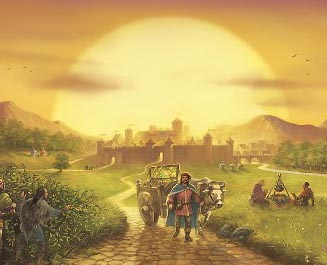
After you roll for resource production, you may trade with other players (domestic trade) or with the bank (maritime trade).
If you decide not to trade during your turn, no one can trade.
You may trade with another player between your turns, but only if it is his turn and he elects to trade with you.
You cannot trade with the bank during another player's turn. You may not give away cards.
You may trade as long as you have Resource Cards. You may not trade Development Cards. You may not trade like resources (e.g., 2 wool for 1 wool).
Resource Trade
In the second phase of your turn, you may trade with the other players.
The other players may not trade amongst themselves, only with the player whose turn it is.
There are 2 different kinds of trade:
- I. Domestic trade
- II. Maritime trade
I. Domestic Trade
On your turn, you may trade resources with the other players(after rolling for resource production).
You and the other players negotiate the terms of your trades-such as which cards will be exchanged.
You may trade as many times as you can, using single or multiple cards, but you may not give away cards (i.e., "trade" 0 cards for 1 or more cards).
Important: While it is your turn you must be a part of all trades, the other players may not trade among themselves).
II. Maritime Trade
On your turn, you can trade resources using maritime trade during the trade phase even without involving another player.
The most basic (and unfavorable) exchange rate is 4:1.
You may trade 4 identical Resource Cards to the supply in exchange for the Resource Card of your choice.
You do not need a harbor (settlement at a harbor location) to trade at 4:1, so when nobody wants to trade…
-
If you have built a settlement or city at a harbor location, you can trade more effectively.
There are 2 different kinds of harbor locations:
Generic Harbor (3:1)

Here you may exchange 3 identical Resource Cards for any one other Resource Card during your trade phase.
Special Harbor (2:1)

There is but 1 special harbor for each type of resource (with the same symbol).
So, it is important to build on the type of special harbor you can use fairly frequently.
The exchange rate of 2:1 only applies to the resource shown on the harbor location.
A special harbor does not permit you to trade any other resource type at a more favorable rate (not even 3:1)!
Trading Strategies

People seem pretty split on trading. It seems that some will only trade kicking and screaming, as they see big problems with helping other players.
Others don't seem to mind, as long as they make sure to look out for number one. I have always tried to trade as much as I can in the early game, primarily out of one big fear.
If I don't trade with Player X, Player X is going to trade with Player Y. In this case,Player X and Player Y will have a better distribution of resource cards (and hence will build more) than me.
This is especially bad if X or Y is an adjacent and direct competitor with me for future resources. If you don't trade with X, someone else will. This leads me to take the position that trading is necessary, and instead to focus on the question of how to make the trade as advantageous to you (and as disadvantageous to others) as possible, as long as it is going to happen anyway.
The benefits from trading are not always equally distributed. I would take the position that they seldom are. So how does one make sure they are distributed more in your favor then the other person?
-
Try to trade as close to your turn as possible, and preferably on your turn.
Why? If you trade on your turn, you will have a much greater chance of using that card you just got.
For example, you need one more grain to make your city, so you trade a wool to someone for a grain. Trading on your turn means you KNOW where that grain is going to your city. However, the other person does not know they are actually going to use that wool on their turn.
They might be trying for a settlement, and when their turn comes around do not have a clay. Or maybe the robber stole a card. Or a monopoly card was played. Or they wound up producing a wool themselves on that 12 they didn't think they would roll.
In any case, when their turn comes around, they may or may not be using that wool for something. If they don't use that wool, that trade was a bust for them, and you were the one who got the greater benefit from that trade.
The farther from your turn you make a trade, the greater the chance that something will happen that will make that card you got worthless, or of losing the card entirely. And that means the other person probably got more benefit out of that trade than you.
If the person the who plays the turn ahead of you is trying to make a trade with you, try to wait until your turn instead, if you can. They will have to wait another turn to produce what they wanted. Of course, if they really want to they will trade 4 to 1 or through a port, and then you are stuck...
To stop a trade, you can always promise the player who turn it ISN'T that you will trade with them when their turn comes around, by arguing how they will benefit from this and how the player whose turn it is will be hurt, by the reasoning above.
-
Conversely, try to trade with others who are farther away from their turn, all other things being equal. Of course, you don't have much of a choice if it is not your turn, as you have to trade with the person whose turn it is.
Comments 1 and 2 are probably a lot less useful for those of you who play with the Kosmos or (later edition) Mayfair 5-6 player build rules, where anyone can build on any turn.
-
Trade with people who are losing, or are no threat to you. This is a no-brainer.
-
Trade early on as much as possible. You don't want to fall behind on that exponential growth race.
I once played a game in which another player made a four-to-one trade with the bank early in the game, rather than trade one-to-one with me. I thought she was nuts, but then I was a little biased.
However, in order for me not to have the benefit, she fell on the sword herself. I made a two-to-one port trade to get that resource instead, and was therefore two cards ahead of her. The real winners were the other two players.
Losing this many production cards this early on did not help her growth rate at all, and I wound up winning in a very close battle that she might have very well won instead.
-
Remember, you can always trade for stuff besides cards, though it isn't binding.
How much is it worth to someone for you to build a road and block off a potential port of their immediate competitor? This is useful when you REALLY need a card or cards and have no cards to trade that the other person wants.
And you can always trade wood and brick in unequal trades to the person whose turn it is, to stop someone from getting the longest road (or whatever) when you can't build there yourself.
-
Think of other players as 1:1 ports.
-
It isn't necessarily bad to trade two cards to someone for one you really need (2:1 trade), it just sounds that way.
You are saving cards as your only other options was presumably 3:1 at a port or 4:1 with the bank. If it was a 3:1 port, you are one ahead. As the other player gained one card too, they are also one ahead. You are both ahead in my book, and the real losers are the players who were not in on the deal.
You are probably trying to figure out the catch here. You are correct, there is one. The above only assumes the number of cards are important, not the type. The problem comes in if the other player was also planning to do a port or bank trade to get that resource you just gave them.
That means they are not just one ahead, they might be two or three ahead. In a worst-case scenario they were going to need to do a bank trade at 4:1 for both of those resources you just gave them, meaning they are now SEVEN ahead (it cost them one card instead of eight).

It is up to you to figure out how many cards they are really saving. If you can appeal to their greed and give them two cards they don't really need, or that they could have traded 1:1 for themselves, then go for it. In general, try to do 2:1 trades with people who are behind, those will use those extra cards to screw someone else, those who were going to do a 1:1 trade with someone else to get those resources, those who were not going to need to do port or bank trades to get those resources, those whose turn it just was and therefore have to wait the longest (see 2 above) and have a good chance to get those resources you gave them anyway, those who already have a lot of cards and may attract the robber because of your trade, and of course those who are not just going to use those cards to hurt you. If you do it right, it is a very powerful tactic. If you mess it up, it could come back to bite you.
In most cases, a generally good 2:1 trade with someone is if you give them two resources for which they have a 2:1 port. It's a great trade for them, and they often jump at it. They will trade them in to get one card. So now they wound up trading a card to you, for two cards, which they converted back into one in their port.
It's the same as making a 1:1 trade with you for the resource they really wanted, which they might have made with someone else anyway. Or think of it as you "borrowing" their port for a turn. And you are still one ahead. Just make sure they actually will trade them in at their port, or you might have the same problem as above.
-
It's amazing how many people don't have any particular idea of what to build their next turn.
For those people who just react to what cards are in their hand in deciding what to build (instead of going out and getting what they need), you can force their strategy a bit.
Want them to build a settlement instead of that road that is going to cut off your port? Make sure they get a grain and wool to go along with that brick and wood. Or make sure they draw cards instead of building those ships to that island you want.
-
Don't blindly follow trade embargoes on the person that is ahead.
Chances are, they were set up by a single person for a reason that will benefit them the most, or were set up too early. This is your opportunity to make some very good trades with people that no one else is trading with. I assume you will make sure they won't win because of that trade, although.
Continue Reading


